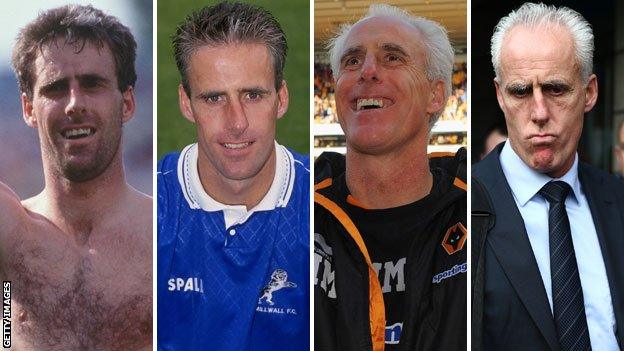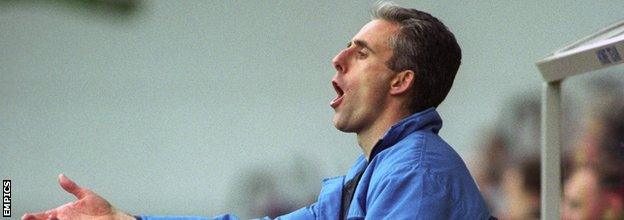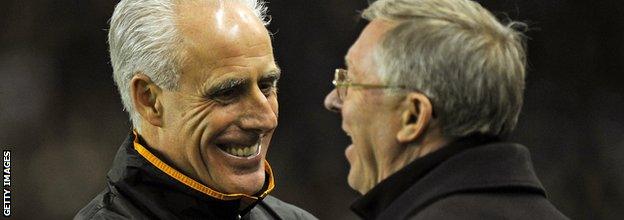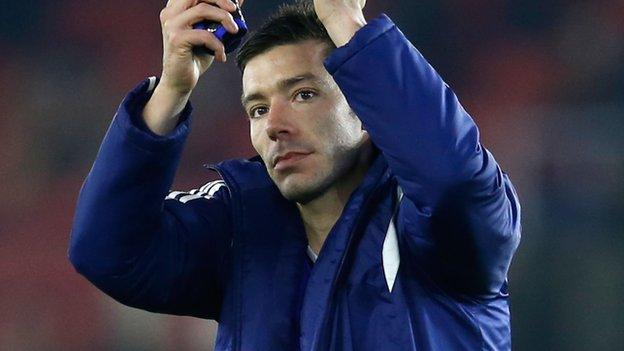Mick McCarthy: Ipswich Town boss gives management insight
- Published

Mick McCarthy: Player, manager, husband, bike enthusisiast
Mick McCarthy, whether he is being loved or loathed, is one of British football's great characters.
As a commanding centre-half he appeared in more than 500 games for Barnsley, Manchester City, Celtic and Lyon, and retired while playing for Millwall in 1992 to become the London club's manager.
As a boss, he took the Republic of Ireland to the knockout stage of the 2002 World Cup, and has guided Sunderland and Wolves to the Premier League.
Now, with his current club Ipswich Town second in the Championship, he has told BBC Radio Suffolk why he thinks promotion with Town is his only way back into the top flight, and gives an insight to his managerial career.
You can hear the full interview on Saturday on BBC Radio Suffolk following commentary of the top-of-the-table clash between Ipswich and Derby (kick-off 12:15 GMT).

Mick McCarthy took Millwall to the play-offs in what is now the Championship in 1994
On starting off in management
"I could say I was thrust into it - that when Bruce Rioch left it was a bolt out of the blue, but I'd be lying slightly.
"When I left Celtic I went to France in 1989 and I had a bad knee. I loved it and wanted to stay. Lyon's a beautiful place.
"I had that thought if I wanted to be a manager in England I needed to have my foot in the door somewhere, so I went back to Millwall."
On looking after players
"I start by treating people the way I would like to be treated. It sounds like a bit of a cliche, but how true is it? As a manager I work hard and I expect everyone who works for me to work hard.
"I work very hard with players who cause me problems. Not necessarily just on the pitch, but off the pitch too. I think I have a lot of tolerance and patience for that.
"If you went and asked the players they wouldn't be saying they are my mates or that Mick's a soft touch."
On who is the best manager
"Sir Alex Ferguson without a doubt. Look at the longevity he had at Manchester United.
"I liked the time Alex Ferguson had for everybody else, the younger managers. I remember getting a note from him when I got my first job 22 years ago. That was lovely. That's a little bit special from a guy who had so much success.
"I don't think that I'm at his level to think I should give someone my number. But lads I know - like Gary Waddock back at Portsmouth - I sent him a text saying 'welcome back to the asylum'."

Sir Alex Ferguson sent Mick McCarthy a note to welcome him to management 22 years ago
On getting the sack
"The word 'sacked' has a resonance to it that doesn't sound particularly nice. It's like an Exocet missile, you know it's coming, you just don't know where from and when.
"I'm not knocking the media, but the speculation starts and it's a story. It grows legs and goes further.
"At Sunderland, we were 1-0 down and Daryl Murphy equalised in injury time and I was convinced I was getting the tin tack if we lost. I never saw so many sad faces considering we had just got a point.
"Getting the sack is a horrible day. There's tears, some of them are mine because I don't want to go.
"At Wolves we lost 5-1 to our nearest and not so dearest rivals West Brom. I still think we would have stayed up with me and [assistant] Terry Connor at the helm. But it's always embarrassing. Everybody knows you've been sacked."
On his wife Fiona
"My wife Fiona has been my real rock, my support all the time. Not only has she looked after our lovely home and family, she's gone to the games and been all over the world watching matches.
"She loves the football by the way. (If) We were in the house and someone asks, 'what's Tranmere's nickname?' I say, 'Fiona will tell you'.
"We've been married 35 years next year.
"If your family are there and you're getting stick - 'Oi there big nose, you're getting sacked in the morning' - that's tough for them. But they know dad is big enough and daft enough to put up with that."
Mick McCarthy's managerial career |
|---|
Millwall: Led them to play-offs in second tier in 1994. Left for Republic of Ireland job in February 1996, and the club were subsequently relegated. |
Republic of Ireland: After failures to qualify for 1998 World Cup and 2000 Euros, he took the Republic to knockout stage of 2002 World Cup despite a fall-out with Roy Keane. |
Sunderland: Could not stop Sunderland being relegated from Premier League when he took over in March 2003. After reaching the play-offs at the first attempt, they returned the year after as champions. He was sacked in March 2006 with the club in the Premier League relegation zone. |
Wolves: Reached Championship play-offs in first campaign (2006-07), but suffered his third play-off failure. Won the title in 2009. Kept the club in the top flight for two seasons, before being sacked in February 2012. Wolves went down three months later. |
On his bike
"I get out on my bike, I love that. It's something I've done for the last 20-odd years.
"I started when I was at Millwall at the end of my career because I was struggling with my knees. Cycling just takes the impact out of it.
"I prefer cycling in the wet and cold than I do golf."
On being away from football
"You're suddenly on the outside, looking in. It really is a horrible feeling.
"A lot of players have struggled with that and struggled with gambling, alcohol, drugs. Or they start businesses that they have no idea about and lose a chunk of money.

Mick McCarthy and his long-time assistant Terry Connor (left) have turned Ipswich into title contenders
"At least football is something they know and love and they get protected by it."
On trying to win promotion to the Premier League
"I would love to take Ipswich to the Premier League.
"Personally, I'd love to do it because I don't think I'd ever get another job in the Premier League. If they're not going to give me one, I'm going to have to boot the door down and gatecrash."
On working in the media
"The first time I did it was with Jon Champion. He said, here's a bit of advice, 'I'll tell everybody what's happening and you tell them why it's happening'. I thought that was great advice.
"I obviously did it OK because I got asked to do it more and more. And I enjoy doing it.
"I didn't find it a challenge. I hear some commentators and think 'you've not got a clue pal, that's a 5-3-2 or there's one in in behind'. I don't find talking about football difficult - why would I?"
Mick McCarthy was speaking to BBC Radio Suffolk's Brenner Woolley
- Published7 January 2015

- Published4 January 2015

- Published20 June 2016

- Published7 June 2019
